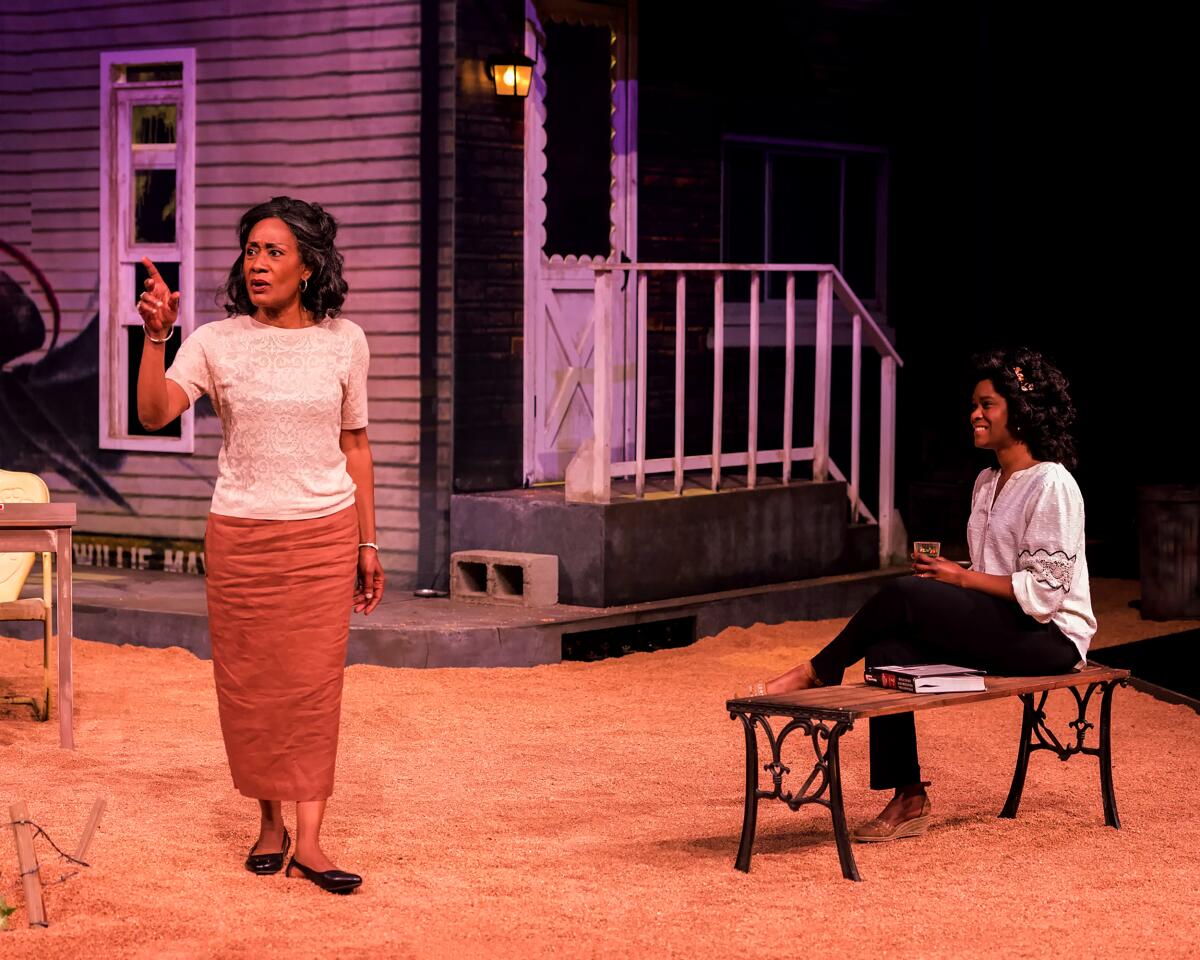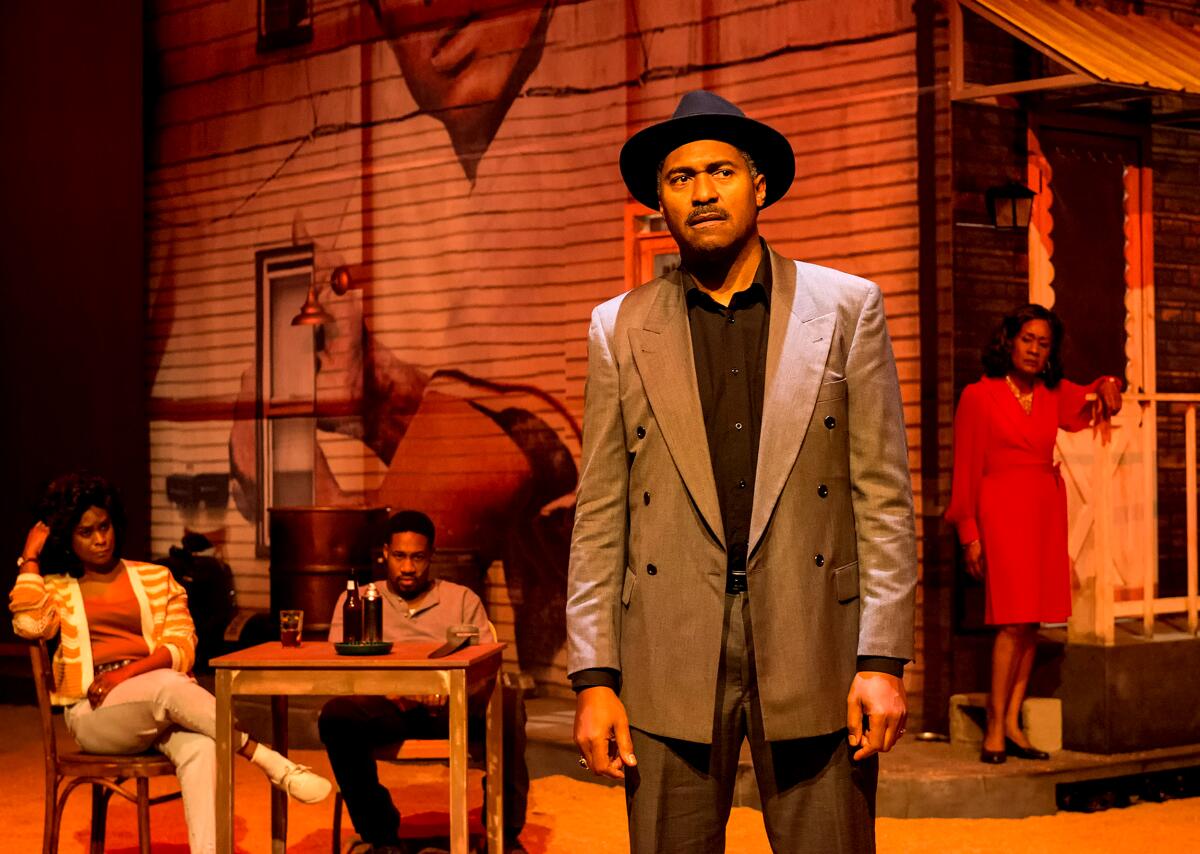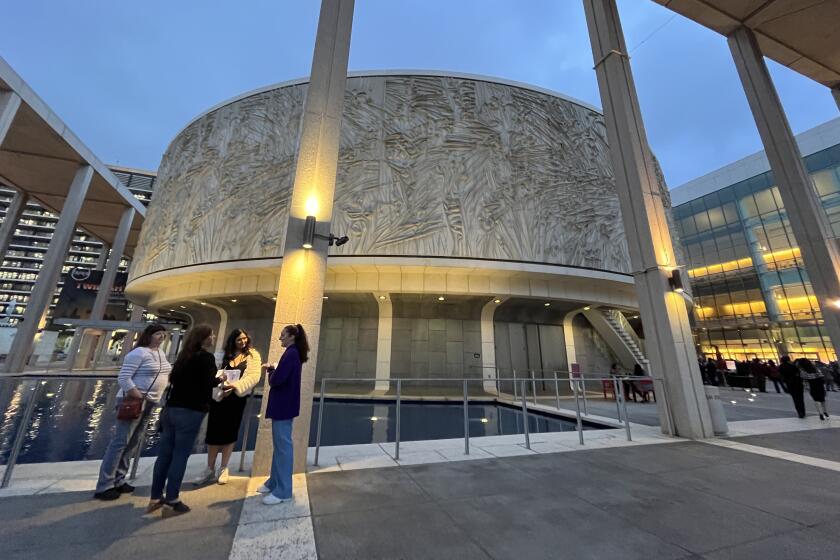Review: An August Wilson master class in acting at Pasadena’s A Noise Within

Not all of the 10 plays in August Wilson’s 20th century cycle are masterpieces. But each and every one provides opportunities for actors to inhabit characters whose dreams, relationships and histories are as intricately arranged as a network of roads, bridges and tunnels in a bygone metropolis.
“King Hedley II,” in a revival at A Noise Within in Pasadena under the crisp and clear-eyed direction of Gregg T. Daniel, shares many of Wilson’s trademark faults. The play is verbose, the plot is sluggishly novelistic and the operatic scale is indulgent. Playwrights benefit from limits, and “King Hedley II” cries out for compression.
On the page these problems are more glaring than they are in the theater. Actors have a way of activating the gifts that Wilson has given them. And the gifts of “King Hedley II” are richly abundant, as this production from A Noise Within makes clear.
The Broadway production of ‘Fat Ham,’ James Ijames’ Pulitzer Prize-winning riff on ‘Hamlet,’ has its West Coast premiere at the Geffen Playhouse in L.A. It’s gripping, outrageous fun.
One of Wilson’s everlasting strengths is the complexity of his supporting characters. Consider Ruby, King’s mother in “King Hedley II,” who left her son in the care of her Aunt Louise when she was pursuing a career as a singer. She came back decades later when Louise was dying. But King, now in his 30s, hasn’t let go of his anger at being abandoned.
Ruby appeared as a sexy young thing in Wilson’s earlier play “Seven Guitars,” which is set in Pittsburgh’s Hill District in 1948 and features Hedley, the man King believes was his father. “King Hedley II” takes place in the same part of town in 1985. The ZIP Code of Wilson’s imagination hasn’t changed, but the mood and music have radically transformed.

Runaway crime has rendered human life cheap. No one feels safe walking the streets, and petty insults are reason enough for someone to start shooting. Money is all that matters. Reaganomics and rampant consumerism are unraveling civil rights progress as the zeitgeist has become ever more mercenary.
“I used to be worth twelve hundred dollars during slavery,” King (Aaron Jennings), the play’s title character, mordantly observes. “Now I’m worth $3.35 an hour. I’m going backwards.”
Time has certainly left its mark on Ruby. In an extraordinary performance by Veralyn Jones, the character is like a sidewalk flower that has been stomped on by indifferent passersby. Ruby is trying to move gracefully into her last act. Before she takes off again, she wants to make sure King is on the right track and not headed back to jail, where he spent seven years for murdering the man who slashed his face, leaving him with a disfiguring scar.
Ruby understands men like her son, who are desperate to be masters of their own universes. She offers him guidance, but he rejects her maternal concern as too little, too late. Jones’ Ruby is slight of build but strong of resolve. She won’t be swatted away like a pesky fly. She reminds him that she is still his mother, even if the role didn’t always come naturally to her.
The little details of Jones’ performance shed light on the character’s past. Occasionally, there’s a slight slur in Ruby’s speech, suggesting that she’s been taking a nip in the day to cope with the household tension. Once a lounge singer, always a lounge singer — no matter that she quit singing long ago.
Jones layers on the realism with the inconspicuous flair of a great portrait painter, who can capture the soul of a subject through the cut of her dress and the glint of intent in her eyes. When Ruby listens to the storytellers around her, you can see her living their words through her own experience. When she asks for money — to buy beer for herself or flowers for Aunt Esther (the near-mythological figure in the Wilson cycle whose death is announced in this play) — she seems almost offended by the question of when she can pay it back. Such is her faith in her charms. The performance casts such a spell of suggestive truthfulness that I had to exhort myself to pay attention to the other fine actors around her.

Daniel has been working his way through the Wilson canon, and his directorial experience is invaluable in sorting through the thicket of speeches in “King Hedley II.” The actors maintain a brisk clip, which is necessary in a play that takes three hours at top speed. But efficiency would be nothing without clarity, and the lucidity of the playing raises the stakes of a drama that prefers narrative telling to direct enactment.
King is one of those tragic figures ripe for a rude awakening. He wants to believe that he’s in command of his fate, but he’s operating on false assumptions about his identity and the forces of history, capitalism and institutional racism that are arrayed against him.
Jennings might lack King’s menacing edge — he seems more like he has just returned from graduate school than prison. But he muscularly brings to life that quality that sets Wilson’s protagonists apart — the sense of a mind wrestling against constraints that are as existential as they are societal. Standing guard over a plant that’s sprouted from seeds he’s planted, King broods over these tentative shoots as though they were his own potential struggling to emerge in the most inhospitable soil.
CTG Artistic Director Snehal Desai and Managing Director Meghan Pressman lay out a tentative road map for recovery, including the reopening of one of the city’s most important stages.
Relationships are at the core of Wilson’s playwriting, and the community of family and friends is beautifully realized in this production. King and his unswervingly loyal buddy, Mister (an endearing Christian Henley), are fighting an insurgency against their limited opportunities. To make enough money to realize their dream of owning a video store, they enter into risky criminal schemes, not seeing any legit avenues open to them.
King and his wife, Tonya (Kacie Rogers, lending a no-nonsense freshness to the role for which Viola Davis won a Tony Award), are battling over whether a future is even thinkable. King longs to have a son who can continue his legacy, but Tonya is considering having an abortion because she doesn’t want to bring a baby into a world that doesn’t give Black folks a fighting chance.
The character of Stool Pigeon (Gerald C. Rivers), one of those mad-prophet figures that Wilson was so fond of, is tough to theatrically integrate, but the portrayal becomes less conspicuously awkward after the play’s clumsily handled prologue. The connection that is most alive onstage is between Ruby and Elmore (Ben Cain, as faultlessly authentic as Jones’ Ruby). A gambler, con man and old rake, Elmore has come back at the end of his life to marry the woman he’s never been able to shake and to reveal to King something about the past Ruby would prefer to keep buried.
‘One of the Good Ones,’ by Gloria Calderón Kellett, co-creator of the rebooted ‘One Day at a Time,’ has its world premiere at Pasadena Playhouse, directed by Kimberly Senior and starring Lana Parrilla.
Guns are brandished and criminal activity is inescapable, but the main activity of the characters is conversation. Everyone has a story that demands to be told. The drama builds as much by the choices the characters make as by the wisdom that’s gleaned from their collective unburdening. The lesson of these tales, relayed in the backyard between Stool Pigeon’s house and King and Ruby’s, is one of helpless interdependence in a world that is just too small and too chaotic for individual kingdoms.
Daunting in its length and digressiveness, “King Hedley II” is a challenge to revive. It’s a credit to A Noise Within’s commitment to Wilson that this production is as good as it is. The unassuming brilliance of Jones’ performance raises the level to an August Wilson master class.
‘King Hedley II’
Where: A Noise Within, 3352 E. Foothill Blvd., Pasadena
When: 7:30 p.m. Thursdays, 8 p.m. Fridays, 2 and 8 p.m. Saturdays, 2 p.m. Sundays. (Check for exceptions.) Ends April 28.
Tickets: Start at $29
Information: anoisewithin.org or (626) 356-3100
Running time: 3 hours (with one intermission)
More to Read
The biggest entertainment stories
Get our big stories about Hollywood, film, television, music, arts, culture and more right in your inbox as soon as they publish.
You may occasionally receive promotional content from the Los Angeles Times.














